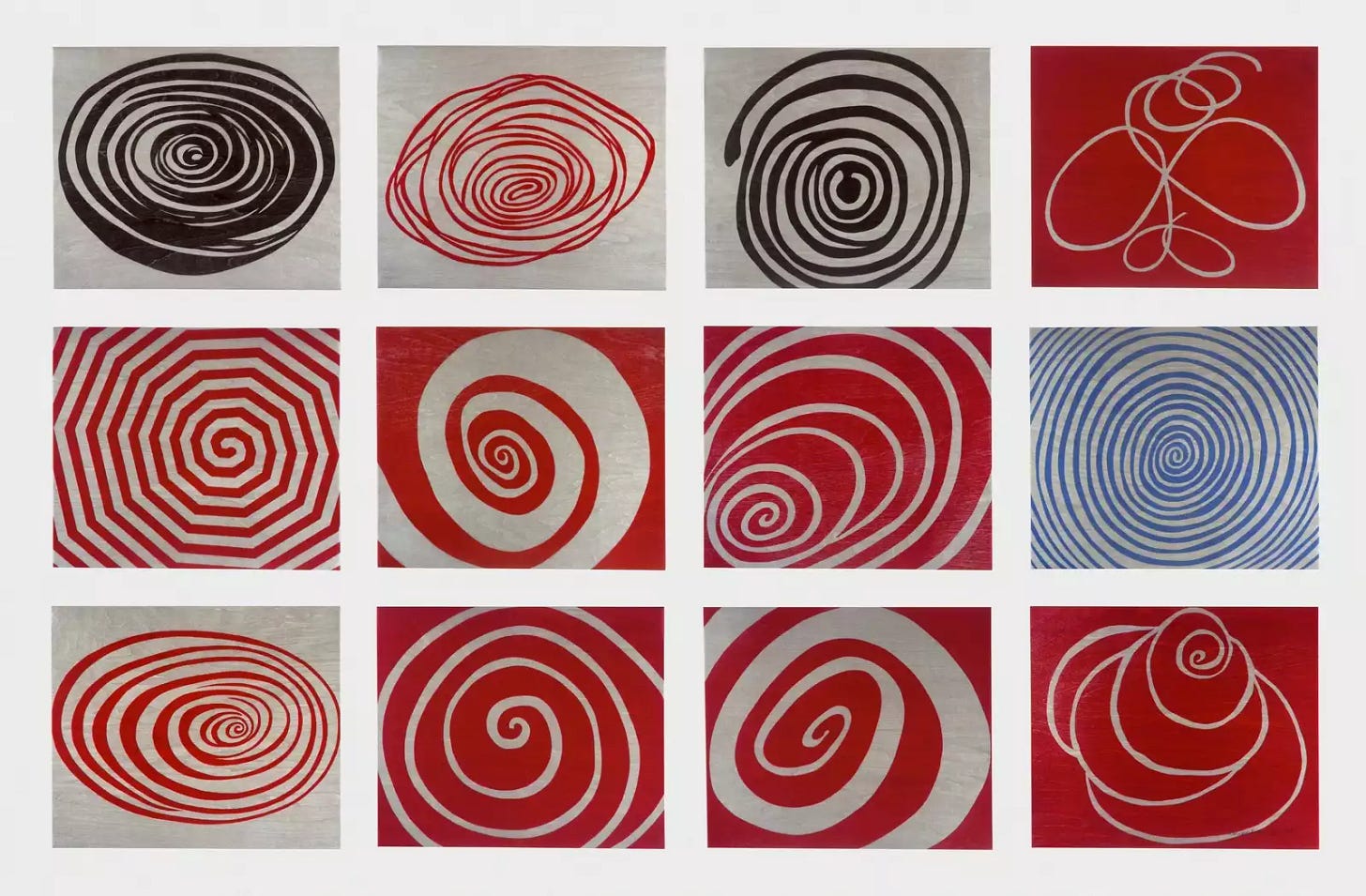Hello there,
Welcome to the first Murmuration of June. If you haven’t heard from me in this way before then I’m especially glad you are here. This is a newsletter which I send out by email twice a month. Sometimes I talk about culture and the environment, on other occasions I share more personal thoughts about being a writer, mother and person who lives with depression. If you want to read previous editions of The Murmuration you can browse them here. You can find out more about my work as a writer and editor here.
When I was thinking about how to write about addiction, [I realised] it wasn’t a linear process. It was a spiral. It would unwind and then wind back in again when things seemed fine, and then unwind further. It’s also what recovery feels like, just in the other direction.
Octavia Bright, interviewed by AnOther magazine
I loved reading this interview with Octavia Bright this week. Octavia is a writer and broadcaster whose memoir This Ragged Grace: A Memoir of Recovery and Renewal (Canongate) has just been published. I first saw this book at proposal stage and was struck by Octavia’s moving and candid appraisal of her experiences with alcohol addiction. If you are a fan of Amy Liptrot or Deborah Levy’s writing then I’m sure you would find Octavia’s first book an illuminating read.
Her description of recovery as a non-linear process really struck a chord—it chimed with a recent experience I have had as someone recovering from postpartum depression.
A few months ago I shared on Twitter that I had been ‘officially’ discharged by the psychologist who had been treating me since my diagnosis. This had felt like a significant moment in time, and so I marked it by taking a photo and sharing this happy milestone with friends.
When I first disclosed to a crisis team that I had been experiencing invasive thoughts, I was taken to the same room that you can see in this photograph. I sat on a burgundy pleather chair as a psychiatrist asked me to describe in detail the thoughts I had been having about hurting myself and my child. She also asked me a number of other strange questions (had I had any images of myself eating flesh?) which helped her classify my condition. So this photo, taken in the same room, felt especially significant, because it marked the end of a difficult and painful episode.
Needless to say, I was very glad to think I wouldn’t be spending any more time sat on a pleather chair.
But then a couple of months ago my wonderful mental health nurse noticed I was having a bit of a wobble and suggested that I meet with my psychologist again, ‘just to check in and make sure everything was ok’. As you can imagine I was less than thrilled at the prospect, but duly returned to the same room to have some further sessions.
I felt embarrassed. Was the previous declaration of ‘healing’ fraudulent? Didn’t he know I’d been ‘officially’ discharged? My period of illness had finished in January: I really didn’t have any more time to faff about with psychologists …
As someone raised in the West I am prone to think about time as ‘linear, an arrow flying remorselessly from A to B.’ In this worldview, time is a finite resource which is always running away from us, forcing us to move through our days with greater speed, efficiency and ruthlessness. In his book In Praise of Slow the journalist Carl Honoré argues that Christian cultures’ are partly responsible for this phenomena, because they ‘pile on pressure to put every moment to good use.’
I mean, he’s not wrong. The founding father of Methodism, John Wesley, famously instructed his followers to ‘Do all the good you can … at all the times you can … as long as ever you can.’ Our limited time here on earth comes with a set of ethical responsibilities: no pressure!
It may interest you to know that other cultures don’t understand time in this way. In Hinduism and Buddhism time is understood to be cyclical, coming as well as going. Time is abundant, not a finite resource to be chased after and watched.
Octavia rightly points out that recovery resists a linear, one-way-ticket model of time. Once a bad experience has occurred within a linear paradigm, the individual concerned will be able to simply place that moment behind them and recover on an ever-ascending trajectory, until they are finally ‘healed’. It’s a nice idea, but perhaps not wholly realistic.
A spiral view of time and experience challenges this conception. The artist Louise Bourgeois (whose artwork you can see above) said that:
The spiral is an attempt at controlling the chaos.
It has two directions. Where do you place
yourself, at the periphery or at the vortex?
Beginning at the outside is the fear of losing
control; the winding in is a tightening, a
retreating, a compacting to the point of
disappearance. Beginning at the centre is
affirmation, the move outward is a representation
of giving, and giving up control; of trust, positive
energy, of life itself.
My mental health nurse recognised that I had moved further to the outside of my spiral. I was starting to get a little anxious about childcare and kept forgetting to take my medication. I was trying to hold tightly to the ‘healed’ version of myself, and was resisting any suggestion that I was struggling mentally. I really recognise the ‘tightening’ that Louise mentions in her description of the spiral, a sense that you must not let go, because if you let go, you will lose control completely.
I came across another interesting interview with the poet Ocean Vuong this week in The Creative Independent. He highlighted the fact that the Italian philosopher Vico also believed that the spiral was better than the line at representing how time works:
He believes that’s why we repeat ourselves, including our tragedies, and that if we are more faithful to this movement, we can move away from the epicentre through distance and time, but we have to confront it every time.
Ocean Vuong on Giambattista Vico
Vuong, who is half Vietnamese, goes on to explain that their language does not have past participles, ‘So everything is spoken in the present’. Vuong pointed out that this creates challenges for a writer who is published in English, but hinted that it also speaks more accurately about the cyclical nature of history and human experience. ‘Everything in the future has happened and the past is happening still.’
As I’m writing this I’m thinking particularly about the ways in which the internet both resists and complies with linear and spiral time. On the one hand, we probably share parts of our day on here according to our own linear view of the world. But our ‘internet selves’ are always present. If she chooses, my daughter could one day ‘be’ with a teenage version of myself, and tomorrow’s version of myself.
I am all of these people.
Recovery, healing—however you want to put it—is not an exam that you can simply revise for and pass, never to return again. Recovery requires a surrendering of the person you were, over and over again. Recovering requires the acceptance of the person you are, over and over again.
It is learning to hold your own life with lightness and hope.
My experience as a person who continues to live with depression is that the harder I try to ‘fix’ myself through ‘peripheral’ activities (in my case, overwork) the more likely I am to slip under once more.
I have found moments of peace and clarity when I let go of those methods and simply learn to acknowledge and accept my many, messy selves.
A RECOVERY READING LIST
Here are some other books on recovery that you might find useful:
THE OUTRUN by Amy Liptrot: A stunning memoir which weaves together themes of addiction, recovery and nature.
THE BODY KEEPS THE SCORE by Bessel van Der Kolk: A contemporary classic on the way in which traumatic stress affects our mind and body.
THE YELLOW HOUSE by Sarah M. Broom: Broom powerfully traces the experiences of her family, spanning back 100 years, and considers the impact of Hurricane Katrina after it devastated their home. It is one of the best books I have ever read.
Thank you for reading. If you found this newsletter helpful then please let me know by leaving a comment or sharing with a friend. Perhaps you have a book recommendation you’d like to add to this list?
A reminder that paid subscribers make this work possible, and also receive a weekly short missive called ‘Golden Hour’. This Sunday I’ll be sharing a review of Brandon Taylor’s new novel ‘The Late Americans’ … do join us by upgrading to a monthly or yearly subscription. Thank you!











Beautifully written Grace. Thank you for sharing ✨
Thank you Grace. That is really helpful. I have had two serious depressive episodes, and also when I was younger was depressed without understanding it. You are right. Recovery is not linear, and the spiral metaphor is very helpful.